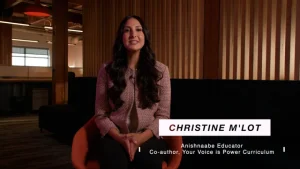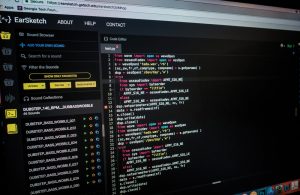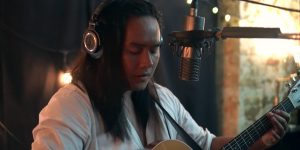Computer science, coding skills, musical creativity.
All three are combined in a national education program that’s also an exciting contest with valuable prizes for students with a passion for computer skills and great music.
Using a popular and freely available software app, participants in the program will learn coding and creativity while remixing music from Canadian Indigenous artists. Students can pick and choose from thousands of loops in the music library to make their own songs.
But the catch is in the code: using EarSketch, a free online code editor that’s available in English, French, Ojibwe, and Inuktitut, students will write their own code using either JavaScript or Python, the two coding languages covered by the software, in order to compose their new tunes.
The national education program is called Your Voice is Power, and it is an important initiative from Amazon Future Engineer Canada, a computer science and STEM (science, technology, engineering and math) education program that wants to help young people realize their potential.
After reaching some 15,000 students last time, organizers are upping their game and hoping to reach 20,000 Canadian middle and high school students in 2024!
By generating an early interest in STEM education, programs like Your Voice is Power help students from underrepresented communities build digital literacy and computer skills that can lead to transformative technology careers.
But this program is not only about STEM education: participants in the program (it is as much a learning curriculum as it is a contest) will remix tunes originally created by some award-winning, chart-topping Indigenous musical artists. Students will remix music from Indigenous artists such as Jayli Wolf, Dakota Bear, and Juno-nominated artist Aysanabee, who not only provides music for the curriculum but will join the competition judging panel.
And that’s not all: the program is not only about computers, coding and music, as there is a strong social justice education component as well. Students from diverse backgrounds will learn the basics of computer coding while engaging in discussions about the experiences of First Nations, Inuit, and Métis peoples in Canada, including topics like Residential Schools, the Sixties Scoop, and the many calls to action made by the country’s Truth and Reconciliation Commission.

Students from diverse backgrounds can learn the basics of computer coding in class and as part of a national education program known as Your Voice is Power.
Participants in the program do not really need more motivation to get involved, but program coordinators offer yet another enticement: two students will receive $5,000 scholarships, selected from participants who submit their remixes to the program award competition.
Amazon Future Engineer, Amazon Music and TakingITGlobal are behind the launch of the 2024 edition of Your Voice is Power, and as mentioned, organizers have raised the target to more than 20,000 participants this year, as they seek to inspire and prepare young people for the careers of the future.
“There is a strong demand for computer science-related careers,” said Cynthia Caglar, Head of Amazon Future Engineer Canada, “but we know that many Canadians – especially those from underserved backgrounds – risk being left behind. Your Voice is Power gives students and teachers an introduction to coding while demonstrating how music and computer science can be tools to advance social justice, which can help them identify future academic and career possibilities.”
The Your Voice is Power curriculum is available at no cost to teachers and students in Grades 7 through 12. The curriculum and lesson plan, featuring eight modules that teach the basics of coding, was built by TakingITGlobal in a collaboration with the Cloud Innovation Centre at the University of British Columbia (UBC) that involved hundreds of hours of consultation and review.
The UBC CIC, a private/public collaboration between Amazon Web Services (AWS) and UBC, also made use of connections with Indigenous experts, students and alumni as well as to UBC faculty.
Anishinaabe educator Christine M’Lot is also involved in the program, which she says helps young people “engage with technology in a way that puts their stories at the forefront and empowers them to apply new skills to share their own unique perspectives on the Indigenous experience.” A high school teacher and education consultant, M’Lot now designs classes and projects that introduce students to Indigenous culture via math or coding.

Seen here speaking on YouTube about Your Voice is Power, Anishinaabe educator Christine M’Lot led development of the computer coding program on behalf of TakingITGlobal.
M’lot, who led curriculum development on behalf of TakingITGlobal, adds that the program “makes it possible for more diverse voices to resonate in a field that is helping shape Canada’s future, but doesn’t currently reflect our society.”
(A 2023 report from the Toronto Metropolitan University, shows that Indigenous Peoples in Canada are engaged in tech-related employment and industry at only half the rate of people from non-Indigenous communities.)
The coding program that Your Voice is Power participants will use, EarSketch, was first created in 2011 by academics and developers based in Atlanta, Georgia; it was developed to blend coding with music production, using an interface similar to Apple’s popular Garage Band program.

EarSketch requires no previous experience with music or computer programming, and it’s used by tens of thousands of students.
Released online in 2014, the free-to-use app is now used by tens of thousands of students from some 300 schools in more than 100 countries.
EarSketch requires no previous experience with music or computer programming, developers describe, working with short snippets of sound known as “loops” that were created by electronic musicians.
A library of music samples was provided (students can also upload their own) for the program by Young Guru, an audio engineer for Jay-Z, and an experimental electronic musician named Richard Devine.
Using the programming languages Python and JavaScript to assemble the samples into full-length songs, students can create new works and share with friends, pull up at dance parties, or use as ringtones on their phones.

Juno Award-nominated artist Aysanabee has provided music for the curriculum and has joined the Your Voice is Power competition judging panel.
So you may hear Juno Award-nominated artist and Toronto-based singer-songwriter Evan Pang, performing under his mother’s maiden name, Aysanabee, who has not only provided music for the curriculum but has joined the competition judging panel. Aysanabee, an Oji-Cree singer-songwriter, has received three 2024 Juno Award nominations for his album Here and Now, in the categories of Contemporary Indigenous Artist of the Year, Songwriter of the Year, and Alternative Album of the Year.
Amazon Music subscribers in Canada can stream an exclusive Your Voice is Power playlist featuring songs by Twin Flames, Jayli Wolf, Dakota Bear, Samian, and many others.
The deadline to submit entries to the 2024 Your Voice is Power student competition is May 31, 2024, and the winners will be selected in June.
-30-



